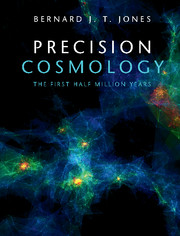Book contents
- Frontmatter
- Dedication
- Contents
- Preface
- Notation and Conventions
- Part I 100 Years of Cosmology
- 1 Emerging Cosmology
- 2 The Cosmic Expansion
- 3 The Cosmic Microwave Background
- 4 Recent Cosmology
- Part II Newtonian Cosmology
- Part III Relativistic Cosmology
- Part IV The Physics of Matter and Radiation
- Part V Precision Tools for Precision Cosmology
- Appendix A SI, CGS and Planck Units
- Appendix B Magnitudes and Distances
- Appendix C Representing Vectors and Tensors
- Appendix D The Electromagnetic Field
- Appendix E Statistical Distributions
- Appendix F Functions on a Sphere
- Appendix G Acknowledgements
- References
- Index
4 - Recent Cosmology
from Part I - 100 Years of Cosmology
Published online by Cambridge University Press: 04 May 2017
- Frontmatter
- Dedication
- Contents
- Preface
- Notation and Conventions
- Part I 100 Years of Cosmology
- 1 Emerging Cosmology
- 2 The Cosmic Expansion
- 3 The Cosmic Microwave Background
- 4 Recent Cosmology
- Part II Newtonian Cosmology
- Part III Relativistic Cosmology
- Part IV The Physics of Matter and Radiation
- Part V Precision Tools for Precision Cosmology
- Appendix A SI, CGS and Planck Units
- Appendix B Magnitudes and Distances
- Appendix C Representing Vectors and Tensors
- Appendix D The Electromagnetic Field
- Appendix E Statistical Distributions
- Appendix F Functions on a Sphere
- Appendix G Acknowledgements
- References
- Index
Summary
It could be said that the discovery and subsequent exploration of the cosmic microwave background radiation marked a transition from cosmology as a branch of astronomy that was largely a philosophical endeavour to cosmology as an astrophysical discipline that is now a fully fledged branch of physics. The CMB established a secure physical framework within which we could undertake sophisticated experiments that would define the parameters of that framework with ever greater precision. As understanding has grown, more and more of traditional astronomy has been embraced to provide evidence in support of this new paradigm: we have garnered evidence from the study of stars, such as supernovae, of galaxies and their velocity fields, and from observations of galaxy clusters and clustering. These studies have involved ground-based and space-based experiments at all wavelengths from radio to gamma-rays.
‘Precision Cosmology’ was born and we now have the recognised disciplines of ‘astro-particle physics’, ‘astro-statistics’ and ‘numerical cosmology’, to name but a few.
Fifty years on from the discovery of the CMB a number of issues have been clarified, but many more remain. Among the numerous areas of active research in cosmology today, there are three which have particular bearing on the first half million years: dark matter, dark energy and gravitational waves.
In the Aftermath of the CMB
The discovery of the CMB not only served to establish our cosmological paradigm as the Hot Big Bang theory, it also stimulated a growth in cosmology as a branch of physics. Fifty years later cosmology has reached a depth and precision of understanding that would have been inconceivable prior to 1965. The 50 years from 1965–2015 saw remarkable advances on both theoretical and data-acquisition and analysis fronts, which are described briefly in this chapter. One important consequence is the blurring of the boundary between theory and observation. Theoretical advances have driven experiments to gather and analyse data through which the theory could be exploited, while ever more sophisticated experiments demand improved methods of data analysis and impose constraints on the values of the parameters of the theories.
It has previously been said that the essence of physics, and science in general, is that it should be possible to perform experiments and to have other groups repeat those experiments, thus providing verification of the results and the consequent conclusions.
Information
- Type
- Chapter
- Information
- Precision CosmologyThe First Half Million Years, pp. 77 - 94Publisher: Cambridge University PressPrint publication year: 2017
